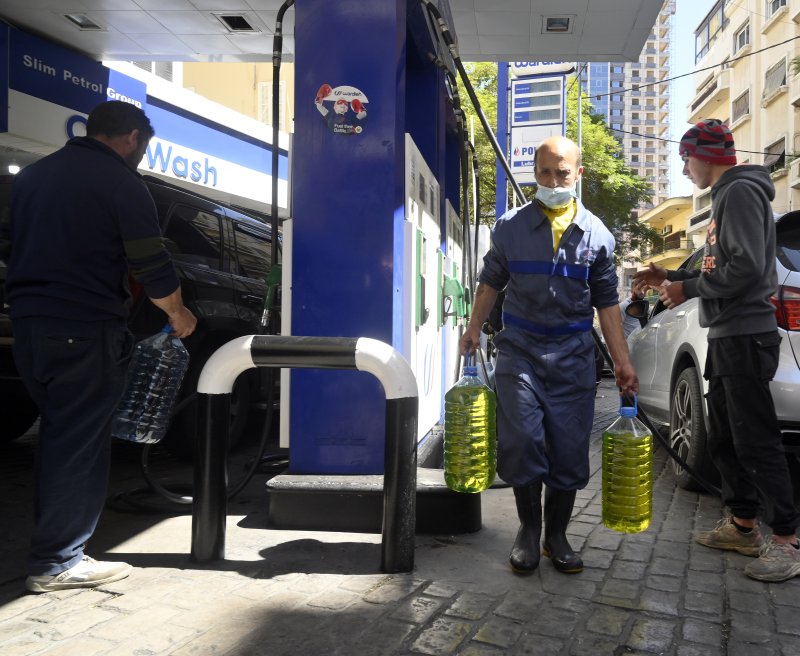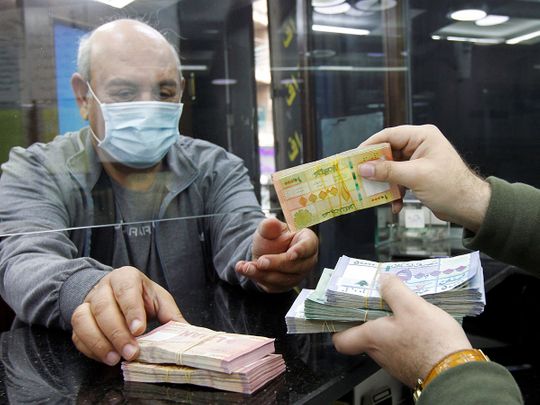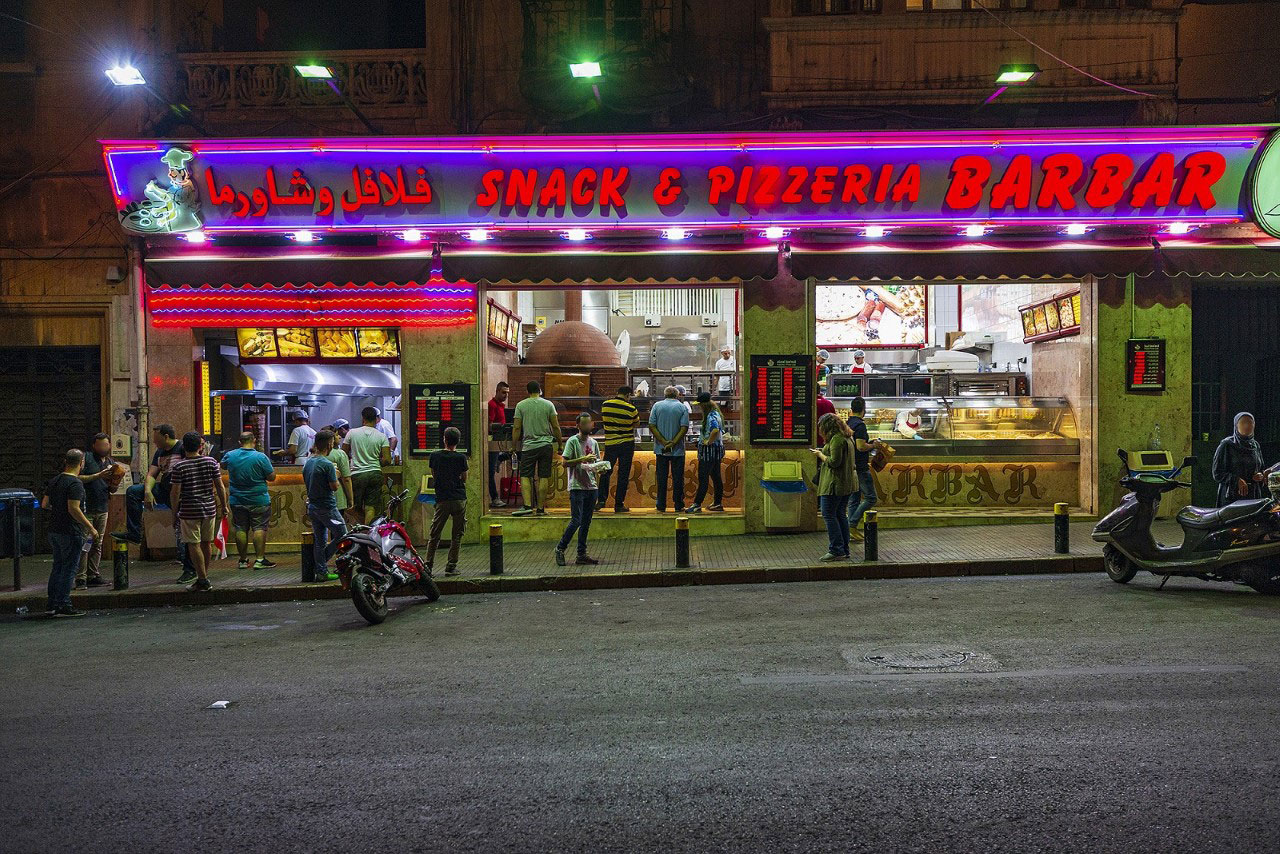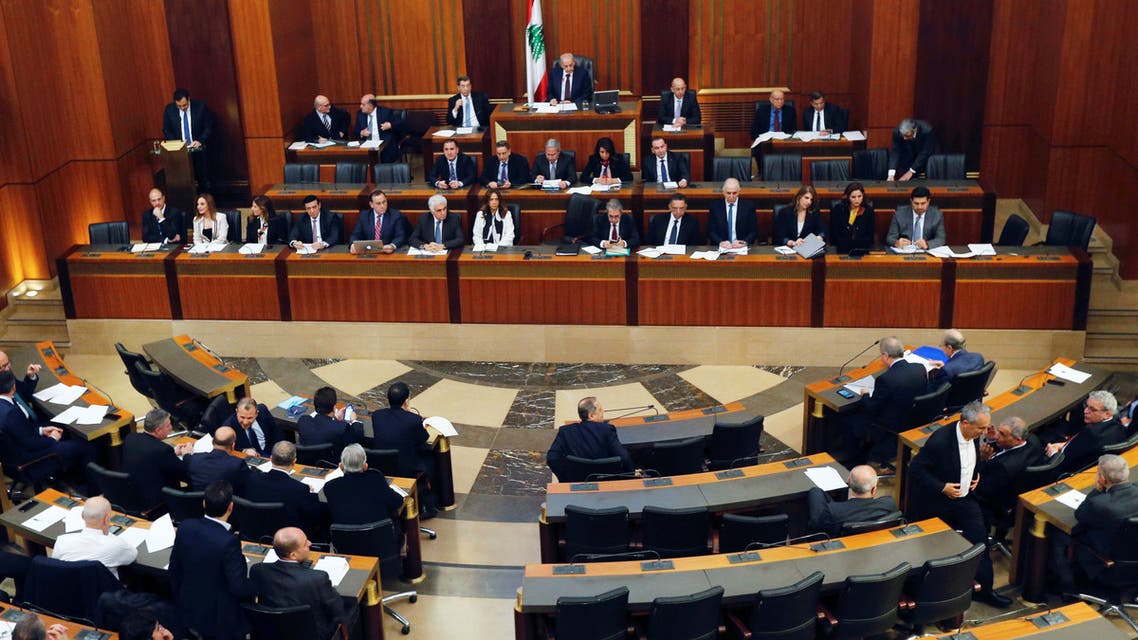BEIRUT (Reuters) -Lebanon’s top Christian cleric has made unusually direct comments criticizing the Shi’ite Hezbollah movement, accusing it of harming the country by dragging it into regional conflicts. “I want to tell them…You want us to stay in a state of war that you decide? Are you asking us before you go to war?” Maronite […]
by middleeastmonitor.com — Lebanese Druze leader Walid Jumblatt has asked why the UN-sponsored talks between Lebanon and Israel on maritime border demarcation around potentially oil- and gas-rich areas have stopped. Jumblatt heads the Progressive Socialist Party of Lebanon. He wrote on Twitter that he was surprised by “the death of demarcation” after Parliamentary Speaker Nabih […]

by dw.com — Lebanon has been known as “the Switzerland of the Middle East” for decades because of its strict banking secrecy laws. But as the country falls ever deeper into economic crisis and debt, the banks that once drew so much foreign capital to the country are also in trouble. Local economists estimate that altogether, Lebanese banks owe over $90 billion (€77 billion), and say that since late 2019, they have severely restricted withdrawals and foreign transfers, especially in US dollars. There have been many stories about the financial damage done to ordinary Lebanese by these moves as their currency goes into free fall. The Lebanese pound has lost over 85% of its value against the US dollar on the black market. But could potentially insolvent Lebanese banks also spark a dangerous, regional domino effect, causing the same sort of problems for the Middle East as an indebted Greece did for the European Union during the 2008 financial crisis? Billions lost
Late last year, Syrian dictator Bashar Assad blamed his country’s ongoing economic woes on the fact that anywhere between $20 billion and $42 billion belonging to Syrian depositors was trapped in Lebanon. Syrian businesspeople have long used Lebanese banks to avoid international sanctions and other restrictions. Earlier in 2020, research by a Yemeni think tank, the Sanaa Center For Strategic Studies, suggested that as much as 20% of Yemen’s foreign currency reserves, estimated at around $240 million, were stuck in Lebanese banks. And in the semi-autonomous northern Iraqi region of Kurdistan, politicians claimed that up to $1 billion of money from oil sales was trapped with Lebanon’s Bankmed. Lebanese men withdraw money from a Bankmed ATM in the capital, Beirut
By Hanin Ghaddar — english.alarabiya.net — Put simply, Lebanon is an Iranian colony. As protest slogans indicate, the Lebanese people are finally aware of this reality. The presence and ineffective statements of the former pro-West March 14 political parties means the international community needs clarity about who really controls the country. Only then can policy be drawn accordingly. For the latest headlines, follow our Google News channel online or via the app. The March 14 leaders always justify their inactions by using the fear factor – that if they resign, Hezbollah will take over the state institutions, and they want to make sure they can protect what small margin of independence they have left in Lebanon. Another argument is that they want to prevent the chaos that will happen if state institutions fall completely.
This logic is outdated. Chaos has arrived, and the state – as in the decision of war, government formation, or economy – is in the hands of the Iranian regime and its proxy. The Beirut Port blast and the assassination of Lokman Slim are two examples of how inadequate the state institutions’ roles have become. Without clarity, the international community will continue to try to find an economic solution, to handle Lebanon as a humanitarian crisis. This is dangerous because it hides the real problem, which is political, not financial. If former March 14 leaders get their parliamentary blocs and ministers to resign, the political core of the crisis will be exposed. This could lead to a new and more urgent policy for Lebanon – one that addresses Iran’s hegemony and how to counter it, instead of focusing on humanitarian assistance. A meeting between Lebanese President Michel Aoun and PM-designate Saad Hariri last week ended poorly. Failing to reach a much anticipated breakthrough for the formation of a government the theatrical exchange of accusations was a clear indicator that any new government in Lebanon is some way off.

by arabnews.com — LONDON: A popular Lebanese TV show has come under fire for another incident of offensive behavior. “Indian, I’m not sure — but British-Indian…” the latest guest on the consistently criticized MTV Lebanon show “3a Gheir Kawkab” (On Another Planet) explained, before shaking her head — mocking the traditional Indian nod — and in a stereotypical Indian accent, said: “Madame you’re very beautiful.” The show’s presenter — Pierre Rabbat — and other hosts broke into laughter as the paid crowd roared in applause. By contrast, social media exploded with anger at the blatant racist mockery the variety show was presenting. “The group from ‘3a Gheir Kawkab’ have made the program out of this planet to utter all kinds of pettiness, absurdity, humiliation, disgust, and whatever you want,” said Twitter user Leila Ghotaimi.
Brigitte K. Mountain tweeted: “Morons! And such a grotesque disconnect from what’s happening in the country.” This is now the state of Lebanese television — once a media pioneer of the region that attracted talent from all over — but now a symbol of the country’s dwindling standards. Lebanon has been facing multiple crises since the start of last year. It has endured national demonstrations protesting flagrant corruption and collapsing standards of living, alongside a political standstill that sees its politicians bickering among one another while the Lebanese pound continues to freefall.

By CALINE MALEK — arabnews.com — DUBAI: One Lebanese man has worked day and night since the devastating Beirut blast of Aug. 4 last year to ensure his lifetime’s work is salvaged from the rubble. In less than six months, Robert Paoli became the first trader to reopen a warehouse in the Port of Beirut Logistic Free Zone following the disaster. “I’ve worked in the freight-forwarding business all my life,” the 57-year-old told Arab News. “I always believed in Lebanon from the beginning, and I worked very hard to create my units in the free zone here.” Beirut’s strategic location on the Eastern Mediterranean coastline made the port a thriving economic asset. But all that changed one Tuesday afternoon when a nearby warehouse containing nearly 3,000 tons of highly volatile ammonium nitrate caught fire. The resulting two explosions sent an enormous shockwave through the port and surrounding districts — taking Paoli’s warehouses with it.
Paoli had spent upward of $1.5 million and poured years of hard work into his new warehouse, which had been due to open for business in just a matter of weeks. All types of goods were already stored there, from electrical appliances and tires to chemical agents. Recalling that horrific day, Paoli said he was lucky to have left his office early, a decision necessitated by COVID-19 restrictions in place at the Logistic Free Zone. As he joined his son for a game of tennis at his club 20 minutes out of town, Paoli received an alarming phone call from a friend about a fire at the port. “Having three units there and a new warehouse in the Karantina area very close to the port, I was anxious” Paoli said. “My other friend who lived across the port couldn’t see anything. But five minutes later, I heard the explosion.” The blast was heard as far away as in Cyprus, at a distance of more than 200 kilometers. About 210 people were killed and 7,500 injured as the shockwave flattened nearby buildings and overturned vehicles. Robert Paoli has spent millions rebuilding devastated warehouse units after the Beirut explosion on August 4, 2020. (Supplied) “I thought a bomb had hit my club,” Paoli said. “We were far away, but it floored us and the windows broke.”

By Dalal Saoud — upi.com — BEIRUT, Lebanon, (UPI) — Lebanon, which has been relying heavily on migrant workers in recent decades, is no longer an attractive destination for them. With the Lebanese pound losing 90% of its value and U.S. dollars scarce, migrant workers have departed in large numbers, leaving behind once well-off employers who are struggling to make ends meet. The comfortable lifestyle enjoyed after the 1975-90 civil war came to an abrupt end with the outbreak of the country’s worst economic crisis in October 2019. The number of migrant workers — who handled low-skilled jobs that Lebanese never accepted, such as porters, concierges, house cleaners and gas pump operators — has been declining rapidly.
According to Information International, a Beirut-based research and consultancy firm, the Lebanese General Security issued 9,780 work permits in 2020 compared to 57,957 the previous year, a decrease of 83 percent. The number of workers from Ghana dropped by 93.9%, the Philippines by 86.3%, Bangladesh by 85.3% and Egypt by 79.2 %. The cause is clear: Lebanese who have lost their jobs and savings at the banks and employers who were forced to close their businesses are no longer able to pay their migrant workers in hard currency with the depreciation of the Lebanese pound. The alarming spread of COVID-19 in the country and hyperinflation added to the plight. Late last year, the evacuation of migrant workers accelerated, with Ethiopia and Sri Lanka sending planes to repatriate their national workers, mostly housekeepers, many of whom had been abandoned by their employers.
by aljazeera.com — France’s foreign minister has cranked up pressure on Lebanese leaders to form a government, urging them in personal phone calls for an immediate halt to what he called “deliberate obstruction” that is driving the country towards collapse. Jean-Yves Le Drian called Lebanese President Michel Aoun, acting Prime Minister Saad Hariri, and parliament speaker Nabih Berri and deplored the seven months of political deadlock that is worsening Lebanon’s economic crisis, according to a statement from the foreign minister’s office on Monday. “The deliberate obstruction of any prospect of an exit from the crisis … by demands that are unreasonable and out-of-date must immediately halt,” it said. “The time has come to strengthen pressure” to end the blockage, it added. Last week, talks between Aoun and Hariri on the formation of a new cabinet broke down. Le Drian is also asking European counterparts to join the push for action. Last year French President Emmanuel Macron proposed a road map to break the political impasse in the former French protectorate.
Worst economic crisis

By Tawfiq Nasrallah — gulfnews.com —Dubai: Lebanon’s food prices have become the highest in the Middle East and North African region, as inflation rates continued to soar amid one of the country’s worst economic crises to date, Al Arabiya reported. According to the World Bank periodic assessment of the repercussions brought about by the COVID-19 pandemic on food price inflation in the MENA region, it was found out that between February 14, 2020 and March 8, 2021, prices in Lebanon surged across all food categories. The country’s inflation rate in 2020 rose to almost 85 per cent, Lebanese media reported, adding that it hit its highest point since 1992. By the end of 2020, inflation stood at 145.8 per cent. The World Bank assessed food prices of five main food categories in 19 different countries across the region, including carbohydrates, fruits, meats, dairy products and vegetables.
Fresh and frozen cattle meat prices jumped by 110 per cent during the assessment period, indicating the highest increase in price for this item in the region. Lebanon, Syria, and Djibouti were the only three countries to record a rise of over 35 per cent in this category. The average price increase in this category across the rest of the region was 11 per cent. The price of eggs increased by an average of 7 per cent for the rest of the region while Lebanon, Djibouti, Iran, Syria and Yemen saw a rise of more than 20 per cent in the price of eggs. Potato prices in Lebanon rose by just over 71 per cent, accounting for the highest in MENA while the prices of frozen chicken rose by 68.4 per cent. The World Bank also found that the prices of apples and oranges in the country grew by 58.2 and 58.4 per cent respectively.

by arabianbusiness.com — Born during Lebanon’s civil war, the Barbar restaurant is now expanding from its humble beginnings across the Gulf, bringing the popular Beiruti street food to Saudi Arabia and the UAE. The 43-year-old Barbar will open its doors on Dubai’s Hessa Street around mid-May. In partnership with Kitch, the iconic Beirut restaurant will further expand in the GCC with eight restaurants and cloud kitchens planned for the UAE and 20 in Saudi Arabia, four of which will start operating in Riyadh in the second quarter of this year. Kitch said it will also open two Barbar restaurants in Qatar by the beginning of 2022. Mohammad Ghaziri launched Barbar in 1979 during the Lebanese civil war as a small manouche bakery in front of the famous Piccadilly theatre in the heart of Beirut. Within the first few years of opening, the restaurant gained fame and was visited by singers, artists, and celebrities who performed at the theatre.
Barbar remained open for the remainder of the war and continues to remain open 24/7, though it briefly shut its doors during government-mandated coronavirus lockdowns. Today, Barbar is regarded as a tourist attraction. Out of the 700 items on Barbar’s Beirut menu, 160 menu items will make the trip to the GCC in a condensed version of the menu which still includes shawarma, falafel, barbecue, some cocktails and staple sandwiches. Hybrid cloud kitchen concept Kitch targets GCC growth after Saudi, UAE launch “Choosing from 700 items is not an easy task, but the most important thing is providing the same experience for consumers here that is found in Lebanon in terms of the quality of food, the variety, the most popular items and the overall service,” said Walid Hajj, co-founder and CEO of Kitch. Keeping the Beirut feel Similar to the Beirut version, regional Barbar will be within the affordable price range but Hajj invoked the Big Mac index to illustrate that prices will be based on what is considered reasonable in the country of operation.




